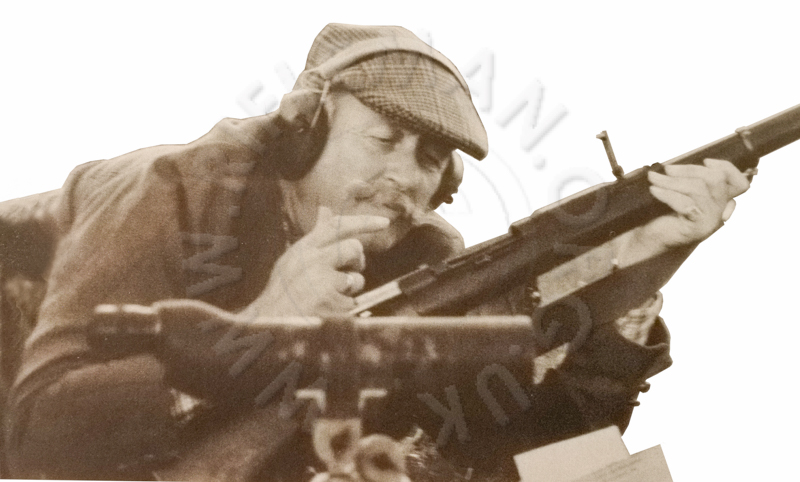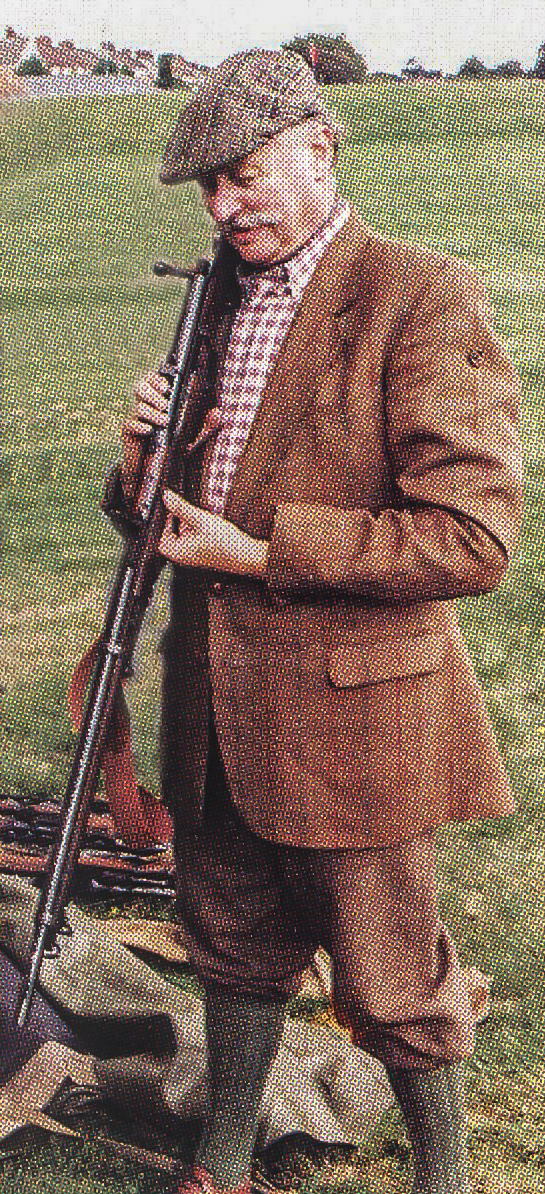Andrew St. George Tucker
We replicate the obituary published in The Times - July 2003
Successful gunsmith and accomplished rifleman who won gold at the 1990 Commonwealth Games
Andrew Tucker won international honours in small-bore and full-bore rifle shooting in 39 consecutive years from the early 1960s. He won the Queen's Prize at Bisley twice, the Bisley Grand Aggregate, the National Smallbore Rifle Association Lord Roberts Trophy and its Grand Aggregate (twice), and Commonwealth Games gold and silver medals. At the time of his death he was the appointed captain of the Great Britain Veterans ' team competing in the World Long-Range Championships in July. In 1990 he was selected to represent England in the full-bore rifle events at the Commonwealth Games in Auckland. There, with Simon Belither, he took the gold medal in the team "pairs" event, on a rifle range converted for the Games from sheep pasture. It was an experience not without difficulties for all the competitors. In the final shoot at 1,000 yards they were faced by a ferocious wind blowing from left to right. Tucker acted as pathfinder for the England pair, who were at that stage four points ahead of the field, with Belither acting as his windcoach. As he approached his final few shots the wind suddenly started to drop dramatically, still interspersed with sudden gusts, leaving him on his fifteenth and final shot with neither man having much idea of what wind strength to call to make the proper sight adjustments. He waited and as the wind seemed to steady, they agreed that Belither should start his shoot using his two sighting shots to establish the wind strength and direction for them both. Tucker then used their joint experience to produce a bull's-eye for his final shot and coached Belither through the rest of his shoot. As the pair wearily left the firing point, worried that their score might place them among the also-rans, they asked their manager, Phil Harrison, where they had finished. "I think you have won by 15 points," came the reply. Tucker then went on to win a threeway tie-shoot to add the silver medal in the individual competition to his pairs' gold. It was typical of him that on return to the Games village, his mood was not that of celebration but of compassionate concern for his team partner who had finished fourth in the individual event. Andrew St George Tucker was born in 1937 in Edinburgh, where his English father was working at the time for the Ford Motor Company. As his middle name suggested, he never felt inclined to shoot for Scotland. Educated at Felsted School in Essex, he took advantage of a strong Combined Cadet Force based shooting squad. "I was never an athlete: I looked at the list of sport options and picked shooting, probably because it could be done lying down." As a member of the school team he won his first trophy, the Iveauh. at Bislev in 1954. National Service in the RAF started with six weeks' square bashing at West Kirby, Wirral. On one of his first evenings he knocked on the door of their small-bore range to be greeted by the fearsome station warrant officer whom the trainees ranked second only to God. Tucker answered the ferocious inquiry, "Are you any good?", with the information that he normally expected to score 299 out of 300 in three series of competition cards. The warrant officer's profound and bristling disbelief was reflected in the command : "Prove it. lad." Tucker did so. He was posted to Kirkham training centre, Blackpool, later an open prison, for formal training as an armourer/fitter (small arms). He was subsequently sent to West Mailing in Kent, the centre for RAF small-arms maintenance, where the RAF shooting team had all its kit. Under the control of Squadron Leader C.C. Willett, himself a Bisley Queen's Prize winner, he was able to shoot all day, every day. "At weekends we went on patrol round the base with 12-bore shotguns. We were never hungry for there was game in plenty, particularly the hares." He became an honorary life member of RAF West Mailing Rifle Club and a life member of the RAF Target Rifle Club. In 1958 he joined Cogswell & Harrison of Piccadilly, where his first year was spent learning about of all types of sporting rifles, shotguns and pistols. He served 12 heads of state over the years, one regular being King Hussein of Jordan. Indian shooters, too, were regular purchasers of rifles and pistols. In 1964 he married Kathy, the younger sister of one of his co-workers at Cogswell's. Together they spotted a niche market for tailored shooting jackets, rifle slings and shooting gloves, as well as high-grade shotguns and sporting rifles. They moved to Cohham in Surrey where he set up as Andrew Tucker Gunsmiths. As he put it: "We were half an hour from Bisley. Heathrow and the West End of London, and we could serve the world." Over the years many a shooting enthusiast, whether on their way to the grouse moors or to the Bisley ranges, made his shop a first port of call on landing in the country. In 1964 he won the National Smallbore Rifle Association Grand Aggregate for the first time, a feat he repeated in the 1970 s. He appeared regularly at World Cup events partnering, among others, the late double Olympic gold medallist Malcolm Cooper in the prone rifle. He was also noticed on the open ranges by the redoubtable Admiral Hutton who told him that, good as he was, he would never select him for a fullbore national team because he had brought slow shooting habits with him from small-bore. Tucker took note and became one of the fastest shooters of all his contemporaries. In 1974 he gained his first England full-bore rifle cap. His subsequent conversion to concentrate solely on full-bore came about the time of the 1976 Olympics. By common consent he was one of the top six in contention for the GB prone small-bore rifle places and should have been selected. The selectors felt otherwise. Tucker was convinced that the final trials had been conducted to allow them to select someone else. As a result he decided to devote his skills to the open ranges. Smallbore 's loss was undoubtedly full-bore 's gain. As if to prove the point, in that same year he won the St George 's Prize at Bisley. There was no turning back and in 1979 he won the Queen's Prize at Bisley for the first time. With his whole family gathered behind the firing point to watch the final shoot at 1,000 yards he was squadded on Target 2 towards the bottom of Stickledown Hill. With the wind blowing strongly from the left his first sighting shot failed to connect with the target and his next was a "magpie", scoring three. He later freely admitted that he had forgotten to allow for the fact that the first bank of ten targets were partly shielded from the full force of the wind by trees on the left. Thereafter he made 12 bull's-eyes in his 15 shots for a score of 72 which, when added to his scores carried forward, was at the top of the Scoreboard. He later said that the walk from Target 2 to the ceremonial award of the winner's badge at the top of the hill was interminable, but that the traditional ride from the range in the chair carried by fellow shooters was the most exhilarating journey of his life. In 1987 he won the Queen's Prize for a second time, having added the Grand Aggregate to his achievements in 1986. Among his treasured memories he held the performance of his England touring team in Canada in 1995. He had selected a small core of experienced shooters to go with a preponderance of new caps. His trust and belief in the will to win of the young was rewarded when they beat the Canadians on their home ground in Ottawa in the Canada and Commonwealth matches, both close run affairs. He treasured his election to the presidency of the English Twenty Club in 1997 as a signal privilege and honour. A tall man with a commanding presence, topped by a fine handlebar moustache, he did not allow himself to be put off by his marked stammer, always turning it with humour into a positive emphasis for the point he happened to be making. He had an amazing ability to find alternative words, an art honed to a fine point to conquer this difficulty. He was one of the most witty of conversationalists, always ready with an apposite saying. Buttonholed on the firing point one day by a regular customer seeking a tailor-made leather shooting jacket (to replace one that had become a little snug by age-related spread), he remarked: "Sir appears to have allowed his chest to slip over the last few years." Whipping out the ever present tape-measure he added: "Never mind: we relish a challenge." For many years until the early 1990s he served as a member of the National Rifle Association Council and on various sub-committees. In a five-year battle with cancer, he enjoyed the unstinting support of his wife Kathy, who survives him.
Andrew Tucker, gunsmith and rifleman, was born on the 17th. of July 1937. He died on July 9, 2003, aged 65.
He is shown below in 1998 on the Middlewick Ranges at Colchester
inspecting the "Long" Lee-Enfield rifle with which he was competing
in the Colchester Rifle Club's Centenary Celebration Match.
Return to: TOP of PAGE
See this website's Raison d'être

